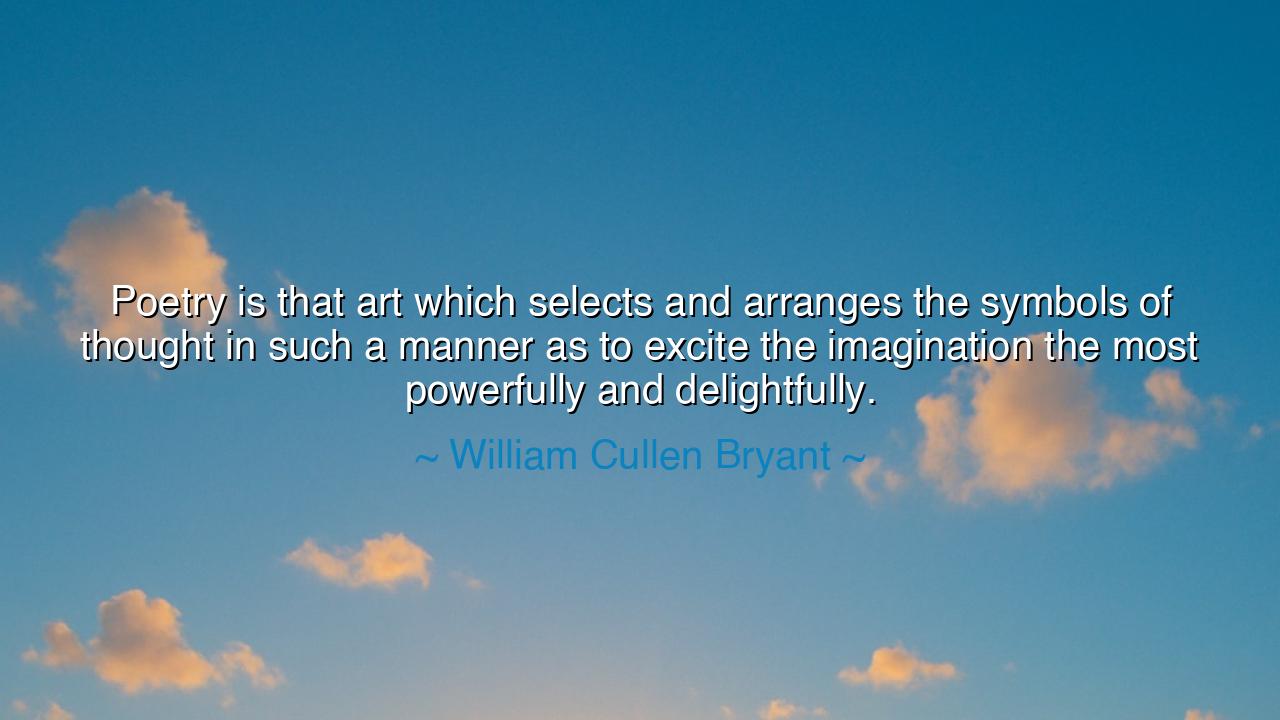
Poetry is that art which selects and arranges the symbols of
Poetry is that art which selects and arranges the symbols of thought in such a manner as to excite the imagination the most powerfully and delightfully.






“Poetry is that art which selects and arranges the symbols of thought in such a manner as to excite the imagination the most powerfully and delightfully.” — so spoke William Cullen Bryant, a voice of quiet majesty from the early dawn of American letters. His words carry the weight of an ancient truth: that poetry is not merely ornamented speech nor the idle play of rhythm and rhyme, but the alchemy of the human spirit. It is the art by which thought becomes flame, by which language transcends the tongue and touches eternity. In this vision, poetry is not about description, but transformation — the transformation of ordinary symbols into living forces that stir the imagination and awaken the sleeping grandeur of the human heart.
In the wisdom of old, poets were not mere writers — they were seers, mediators between the visible and the invisible. To “select and arrange the symbols of thought” is to practice sacred craft. Every word, every image, becomes a vessel for the ineffable. The ancients called the poet a “maker,” for he builds with ideas as a mason builds with stone, but his temple stands in the realm of spirit. What Bryant teaches us here is that poetry is an act of divine selection — not chaos, but careful harmony, where thought is purified and shaped until it gleams like a polished gem, catching the light of imagination and scattering it across the soul.
To “excite the imagination” — that is the holy aim of the poet. For the imagination is the breath of life within us, the bridge between mind and mystery. When the imagination stirs, all things awaken. A few words, rightly chosen, can summon visions vast as oceans, or tender as a child’s sigh. Consider how Homer, with mere syllables, conjured the wrath of Achilles, the burning of Troy, the voyage of Odysseus across the wine-dark sea. His lines are not simply records of war or wandering — they are symbols of the eternal struggles within the human soul: rage, loss, endurance, and the longing for home. That is why the Iliad and the Odyssey live still, while empires have turned to dust.
Poetry, Bryant tells us, is not only to delight, but to delight powerfully. It is not shallow pleasure, but the deep joy that comes from recognizing beauty woven through sorrow, meaning hidden within chaos. True poetry stirs both tears and wonder. When Dante descended into the infernal depths, when Shakespeare gave tongue to kings and fools alike, when Emily Dickinson whispered that hope is “the thing with feathers,” each did more than write — they shaped the symbols of thought into instruments of revelation. They awakened the divine within us, the sense that we are more than flesh and circumstance; we are beings made of dream and desire.
In this, Bryant’s quote reveals a sacred law: that words are symbols, and symbols are keys to the invisible. The poet’s duty is to find the precise pattern — the golden arrangement — by which these keys unlock the heart of the listener. One wrong word, and the spell is broken; one perfect phrase, and the world is transformed. Thus poetry becomes a discipline of spirit — patience, humility, and deep attention to truth. To write poetry, or even to read it well, is to participate in an act of creation, to touch the pulse of eternity through the fragile vessel of human language.
Let us remember also that poetry is not confined to paper. Every life well-lived is a kind of poem — an arrangement of choices, symbols, and moments that either dull the imagination or awaken it. The sculptor shaping marble, the teacher kindling a child’s curiosity, the lover speaking softly in the dark — all are poets, if they act with awareness and beauty. The poetic spirit lives wherever imagination meets discipline, wherever delight and meaning walk hand in hand.
And so, the lesson for all generations is this: seek the poetry in all things. In your words, let there be grace; in your thoughts, precision; in your imagination, fire. Read poetry not as entertainment, but as nourishment for the soul. Write, even if no one reads — for to give thought form is to honor the divine within you. When you speak, when you dream, when you dare to see the world not as it is but as it could be, you partake in the ancient art that Bryant describes — the art that selects, arranges, and transforms. For in the end, poetry is not only what we write; it is what we become.
Thus, carry this truth as your inheritance: poetry is the shaping of thought into light. It is the voice of the soul striving to make sense of beauty and sorrow, to turn the raw material of life into something that sings. Guard that voice, nurture it, and let it speak through you — for as long as imagination burns within humankind, poetry will remain our most powerful and delightful art.






AAdministratorAdministrator
Welcome, honored guests. Please leave a comment, we will respond soon